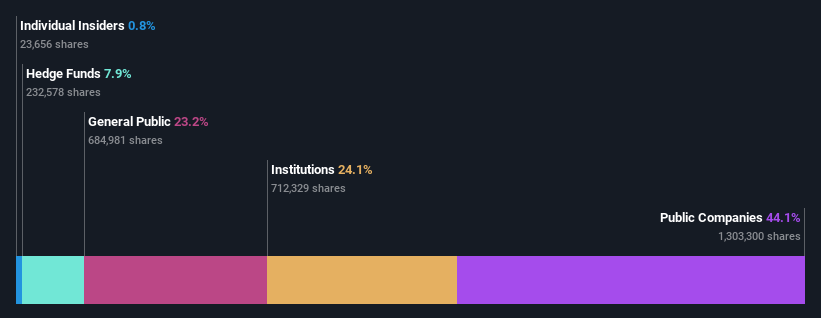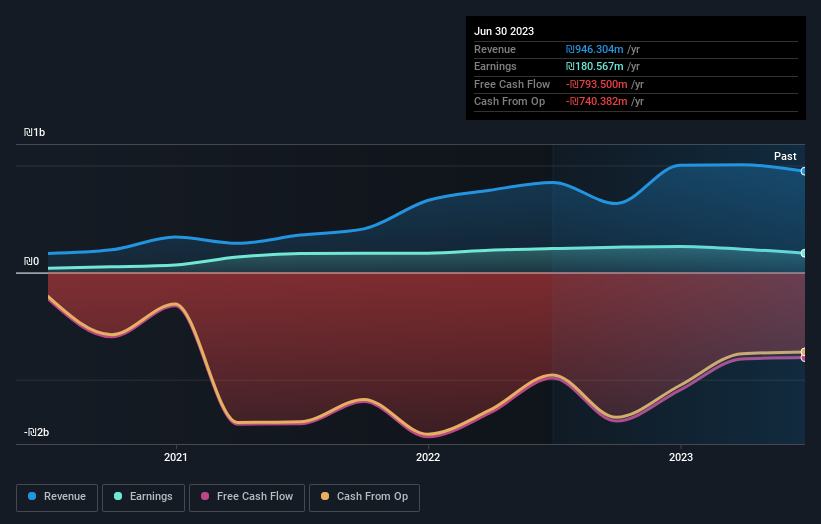Stock Analysis
- Israel
- /
- Consumer Finance
- /
- TASE:DIFI
Direct Finance of Direct Group (2006) Ltd's (TLV:DIFI) market cap dropped ₪151m last week; individual investors who hold 44% were hit as were institutions

Key Insights
- Direct Finance of Direct Group (2006)'s significant public companies ownership suggests that the key decisions are influenced by shareholders from the larger public
- 52% of the business is held by the top 2 shareholders
- Institutional ownership in Direct Finance of Direct Group (2006) is 24%
A look at the shareholders of Direct Finance of Direct Group (2006) Ltd (TLV:DIFI) can tell us which group is most powerful. And the group that holds the biggest piece of the pie are public companies with 44% ownership. That is, the group stands to benefit the most if the stock rises (or lose the most if there is a downturn).
While institutions, who own 24% shares weren’t spared from last week’s ₪151m market cap drop, public companies as a group suffered the maximum losses
In the chart below, we zoom in on the different ownership groups of Direct Finance of Direct Group (2006).
Check out our latest analysis for Direct Finance of Direct Group (2006)

What Does The Institutional Ownership Tell Us About Direct Finance of Direct Group (2006)?
Institutional investors commonly compare their own returns to the returns of a commonly followed index. So they generally do consider buying larger companies that are included in the relevant benchmark index.
We can see that Direct Finance of Direct Group (2006) does have institutional investors; and they hold a good portion of the company's stock. This can indicate that the company has a certain degree of credibility in the investment community. However, it is best to be wary of relying on the supposed validation that comes with institutional investors. They too, get it wrong sometimes. If multiple institutions change their view on a stock at the same time, you could see the share price drop fast. It's therefore worth looking at Direct Finance of Direct Group (2006)'s earnings history below. Of course, the future is what really matters.

It would appear that 7.9% of Direct Finance of Direct Group (2006) shares are controlled by hedge funds. That's interesting, because hedge funds can be quite active and activist. Many look for medium term catalysts that will drive the share price higher. The company's largest shareholder is Zur Shamir Holdings Ltd, with ownership of 44%. For context, the second largest shareholder holds about 7.9% of the shares outstanding, followed by an ownership of 5.3% by the third-largest shareholder.
To make our study more interesting, we found that the top 2 shareholders have a majority ownership in the company, meaning that they are powerful enough to influence the decisions of the company.
While studying institutional ownership for a company can add value to your research, it is also a good practice to research analyst recommendations to get a deeper understand of a stock's expected performance. We're not picking up on any analyst coverage of the stock at the moment, so the company is unlikely to be widely held.
Insider Ownership Of Direct Finance of Direct Group (2006)
The definition of company insiders can be subjective and does vary between jurisdictions. Our data reflects individual insiders, capturing board members at the very least. The company management answer to the board and the latter should represent the interests of shareholders. Notably, sometimes top-level managers are on the board themselves.
Insider ownership is positive when it signals leadership are thinking like the true owners of the company. However, high insider ownership can also give immense power to a small group within the company. This can be negative in some circumstances.
Our data suggests that insiders own under 1% of Direct Finance of Direct Group (2006) Ltd in their own names. It has a market capitalization of just ₪1.1b, and the board has only ₪8.9m worth of shares in their own names. Many tend to prefer to see a board with bigger shareholdings. A good next step might be to take a look at this free summary of insider buying and selling.
General Public Ownership
The general public, who are usually individual investors, hold a 23% stake in Direct Finance of Direct Group (2006). This size of ownership, while considerable, may not be enough to change company policy if the decision is not in sync with other large shareholders.
Public Company Ownership
Public companies currently own 44% of Direct Finance of Direct Group (2006) stock. It's hard to say for sure but this suggests they have entwined business interests. This might be a strategic stake, so it's worth watching this space for changes in ownership.
Next Steps:
While it is well worth considering the different groups that own a company, there are other factors that are even more important. To that end, you should learn about the 2 warning signs we've spotted with Direct Finance of Direct Group (2006) (including 1 which is a bit unpleasant) .
Of course this may not be the best stock to buy. Therefore, you may wish to see our free collection of interesting prospects boasting favorable financials.
NB: Figures in this article are calculated using data from the last twelve months, which refer to the 12-month period ending on the last date of the month the financial statement is dated. This may not be consistent with full year annual report figures.
New: Manage All Your Stock Portfolios in One Place
We've created the ultimate portfolio companion for stock investors, and it's free.
• Connect an unlimited number of Portfolios and see your total in one currency
• Be alerted to new Warning Signs or Risks via email or mobile
• Track the Fair Value of your stocks
Have feedback on this article? Concerned about the content? Get in touch with us directly. Alternatively, email editorial-team (at) simplywallst.com.
This article by Simply Wall St is general in nature. We provide commentary based on historical data and analyst forecasts only using an unbiased methodology and our articles are not intended to be financial advice. It does not constitute a recommendation to buy or sell any stock, and does not take account of your objectives, or your financial situation. We aim to bring you long-term focused analysis driven by fundamental data. Note that our analysis may not factor in the latest price-sensitive company announcements or qualitative material. Simply Wall St has no position in any stocks mentioned.
About TASE:DIFI
Direct Finance of Direct Group (2006)Ltd
Direct Finance of Direct Group (2006) Ltd provides loans for the purchase of vehicles in Israel.
Fair value with questionable track record.

